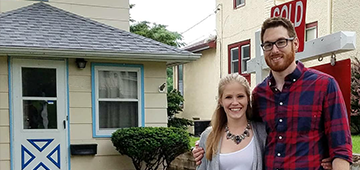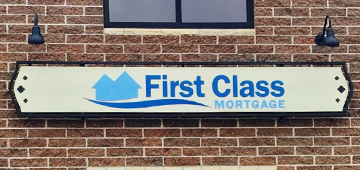Home ownership is a beautiful thing.
Rather than paying rent to support your landlord, your monthly mortgage payments go toward you and your future. You can deduct the cost of your mortgage loan interest from your federal income taxes, as well as your homeowner property taxes. In this society of rapidly rising rent, buying a home is a wise long-term investment. As an added bonus, you might be able to sell your home for more than you paid for it!
At First Class Mortgage, we usually recommend FHA, VA or conventional loans for first-time homebuyers. Not sure which program is right for you? Contact us today! Our consultants at First Class Mortgage will ensure this life-changing transaction is quick, hassle-free and cost-effective. We will find you the perfect loan for the perfect home.
Contact us today to get this party started!
First Time Homebuyer FAQs
Q: What documentation do I need to provide?
The documentation required for each loan differs depending on the loan program. While some programs require income, employment, and asset verification, others require no documentation at all. A mortgage consultant will provide you with a list of items needed.
Q: Are there any loan programs that don’t require a down-payment?
Yes, there are loan programs that do not require a down payment, depending on credit, employment history, and other determining factors. Please contact one of our mortgage consultants for more information.
Q: What is mortgage insurance and why is it required? Is there any way around mortgage insurance?
Mortgage insurance protects the lender against taking a financial loss in the event the mortgagor stops making payments. It is required on mortgage programs that require little or no down payment and the lenders exposure is greater than 80% of the purchase price or appraised value, whichever is less. Mortgage insurance can be avoided by utilizing loan programs such as an 80/20, in which a first mortgage (80% LTV) and second mortgage (20% LTV) are taken on the property. No down payment is required. Or, there is Lender Paid Mortgage Insurance (LPMI). With this option, the lender pays the mortgage insurance, which is offset by a higher interest rate charged to the borrower.
Q: If I’ve filed bankruptcy in the past few years, will I still qualify for a mortgage loan?
Yes, it is still possible to qualify for a mortgage. There are many programs out there for people looking to purchase a home but have lower than average credit. Credit is one of the determining factors when qualifying for a loan, but not the only one.
Q: What are some of the benefits of Government loans (FHA, VA, USDA Rural Housing)?
These programs make it easier to purchase a home for those that otherwise may not be able to afford it. There are programs that require little or no down payments, no pre-payment penalties, and limited amounts of certain fees and charges the borrower must pay to establish the loan. These programs also have rates that are comparable to conventional loans.
Q: How is my ARM rate determined?
Adjustable Rate Mortgages are determined by adding a margin to an index on a specific date.
Q: What is a balloon loan?
A balloon loan is a short term loan with payments amortized over a longer period of time. These payments are not sufficient to pay off the loan in full within the term of the loan. The remaining balance, known as the balloon payment, is due in full at maturity of the note.
Q: How is my monthly mortgage payment applied to my mortgage loan?
Your monthly mortgage payment includes a payment to the principal balance, interest, and escrow, otherwise known as P.I.T.I. (principal, interest, taxes and insurance).
Q: What is the difference between pre-qualification and pre-approval?
Pre-qualification is a lender's judgment of your ability to make payments on your mortgage, based on your verbal statement of income, assets, and employment history. Pre-approval is the underwriting decision that you are conditionally qualified and is subject to the lender's review of your completed application, verification of your income, assets, employment history, credit check, appraisal and other determining factors.
Q: Is there a fee to submit my application online?
No, applying online is free.
Q: Once I’ve submitted my application online, how long will it take before I know if I’ve been pre-qualified?
You will receive a phone call from one of our mortgage consultants within 24 hours of submitting your application.
Q: What is the difference between the interest rate and the annual percentage rate (APR)?
The interest rate is the rate you agree to pay for your mortgage loan. It is used to determine the interest portion of your monthly payment. The annual percentage rate (APR) includes your interest rate and prepaid finance charges to give you an average yearly rate.
Q: What is a discount point?
A discount point is generally a percentage of the loan amount and is paid to the lender to buy down or lower an interest rate.
Q: What is an escrow account?
Your monthly payment includes an amount which is placed in a fund held by the mortgage company to pay your annual property taxes and insurance premiums. This fund is referred to as an escrow account.
Q: What is a rate lock?
A rate lock is a contractual agreement between the lender and buyer. There are four components to a rate lock: loan program, interest rate, points, and the length of the lock.
Q: What are points?
It is an upfront cash payment required by the lender as part of the charge for the loan, expressed as a percent of the loan; e.g. “2 points" means a charge equal to 2% of the loan balance.

Client Testimonials
We make it our first priority to deliver the very best service and experience for our customers.
read more

Why First Class Mortgage
We provide first-class service, first-class knowledge, and a first-class experience.
read more

Locations
Looking for a First Class Mortgage office near you? We have 3 locations to serve you.


